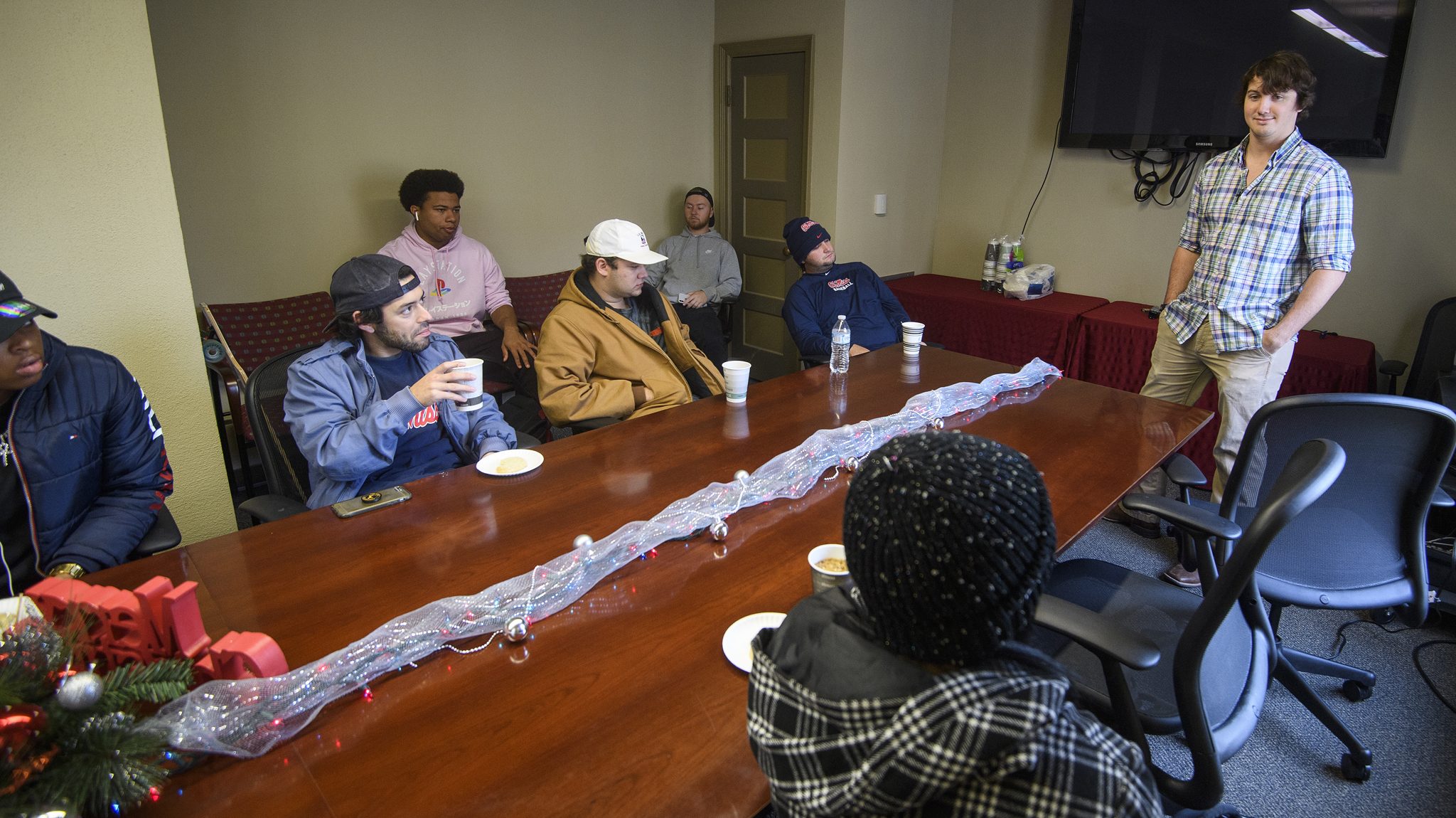
Kellen Weber (right) answers a student’s question about the Student Success Coaching Program during a Coffee with a Coach event. More than 30 participants came to learn about the program. Photo by Thomas Graning/Ole Miss Digital Imaging Services
OXFORD, Miss. – Like many entering freshmen and first-time students, Jazmine Herbert experienced a few challenges adjusting to campus life at the University of Mississippi.
“I was having a difficult time with time management and putting aside time to review my class materials,” said Herbert, a junior psychology major with a minor in education. “My class notes were not organized in the slightest and I didn’t make sufficient study notes.
“On top of all that, I was lacking the ‘push’ to encourage me to do better than I was in my classes.”
Seeking help, the Washington, D.C., native learned about the university’s Student Success Coaching program. Through it, she met Toya Heard, a graduate student who works as one of the program’s coaches.
“Toya has helped me create a Google calendar to help organize my time throughout the week for my classes, work and study time,” Herbert said. “She has helped me better organize myself for my classes, and my study guides are more sufficient.”
Herbert has been meeting regularly with Heard for the past year. During that time, Herbert has noticed remarkable improvements in her grades and her overall well-being.
“The moment I received my grades for the fall semester, I noticed a jump in my GPA,” she said. “Being coached has been an outlet for me, and I always enjoy meeting with her to discuss school and other issues I may be facing outside of my classes.”
The Student Success Coaching program is one of many programs offered through the Center for Student Success and First-Year Experience. Implemented two years ago, the program assists freshmen in transitioning to college life during their freshman year.
Students are paired with a student success coach who assists them with anything college-related, such as surviving roommate drama and getting connected to campus resources such as student organizations and the Career Center.
Staff members also help students refine their college student success skills, including time management and managing test anxiety. Meetings last approximately 30-60 minutes once a week.
Coaching is an opportunity to connect with students on both a personal and academic level, said Heard, a second-year graduate student studying clinical mental health.
“The transition from high school to college can be quite challenging,” said the native of San Jose, California. “Coaching implements time management, study and life skills, and organizational principles.
“The most rewarding aspect of coaching is fostering relationships to facilitate success and bearing witness to students accomplishing their goals, achieving more than they thought possible, and the overall educational growth during the year.”
Kellen Weber, a second-year graduate student on the clinical mental health track in the counselor education program, became a coach because he was looking for a position that would allow him to interact with people in a way that would be helpful.
“Some of these students have come into my office for the first time quite distressed by both their student lives – academics – and their personal lives,” Weber said. “Witnessing these students grow and become comfortable with the balance between the multiple roles that college students play is extremely rewarding.”
Weber admits one of his biggest challenges is reaching out and getting students through the door.
“It is a scary thing to admit that you need help, especially as freshman in college because you want to hold on to that freedom that you can do everything on your own,” Weber said. “Admitting that you need that help can break down that sense of freedom.
“But once a student gets over that initial hesitation, they come to appreciate all the resources that this university offers that are designed to help its students. The biggest reward is watching a student grow and meet their goals. Being a part of that growth is a special thing.”
Herbert said she would recommend the coaching program to any student in need of help with their academic coursework, skill building, organization and note-taking.
“If students utilize the tools we’re giving them, then they do perform better and feel more confident about being at Ole Miss,” said Jeremy Roberts, learning specialist and instructor in the CSSFYE. “Our strategies are time-tested and true.
“It makes me feel amazing when students return to tell me that they’ve put into practice what we’ve shared and found it worked for them.”
Students who attended student success coaching meetings had significantly higher semester GPAs than those who did not attend, said Rebekah Reysen, assistant director of academic support programs and adjunct assistant professor in the CSSFYE.
For more information about either the Student Success Coaching program, visit the Center for Student Success and First-Year Experience website at https://cssfye.olemiss.edu/.